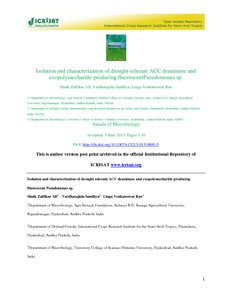Isolation and characterization of drought-tolerant ACC deaminase and exopolysaccharide-producing fluorescent Pseudomonas sp
Abstract
The enzyme 1-aminocyclopropane-1-carboxylate deaminase catalyzes the degradation of 1-aminocyclopropane-1-carboxylic acid (ACC), the immediate precursor of the plant hormone ethylene, into α-ketobutyrate and ammonia. The enzyme has been detected in a limited number of bacteria and plays a significant role in sustaining plant growth and development under biotic and abiotic stress conditions by reducing stress-induced ethylene production in plants. We have screened 32 fluorescent Pseudomonas sp. isolated from rhizosphere and non-rhizosphere soils of different crop production systems for drought tolerance using polyethylene glycol 6000 (PEG 6000). Nine of these isolates were tolerant to a substrate metric potential of −0.30 MPa (15 % PEG 6000) and therefore considered to be drought-tolerant. All of these drought-tolerant isolates were screened for ACC deaminase activity using ACC as the sole nitrogen source, and one (SorgP4) was found to be positive for ACC, producing 3.71 ± 0.025 and 1.42 ± 0.039 μM/mg protein/h of α-ketobutyrate under the non-stress and drought stress condition, respectively. The isolate SorgP4 also showed other plant growth-promoting traits, such as indole acetic acid production, phosphate solubilization, siderophore and hydrogen cyanide production. The ACC deaminase gene (acdS) from the isolate SorgP4 was amplified, and the nucleotide sequence alignment of the acdS gene showed significant homology with acdS genes of NCBI Genbank. The 16S rRNA gene sequencing analysis identified the isolate as Pseudomonas fluorescens. Both sequences have been submitted to the NCBI GenBank under the accession numbers JX885767 and KC192771 respectively

